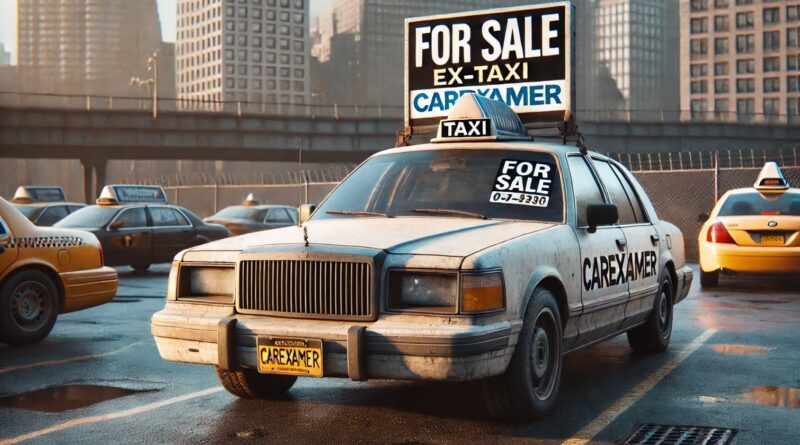Is Buying an Ex-Taxi a Good Idea? Here’s What You Should Know
But is buying an ex-taxi really a smart move? Let’s explore the pros and cons, so you can decide whether it’s a good fit for you. When you’re hunting for a used car, you might stumble upon an ex-taxi being sold for a price that seems too good to pass up. Ex-taxis, or cars previously used as taxis or private hire vehicles, are often cheaper than your average second-hand car. Remember most cars in the market today is ex business vehicles which can be used for various purposes such as ex rental cars short term and long term rentals or ex taxi car or private hire cars.
Pros of Buying an Ex-Taxi
- Lower Price Tag
- The biggest perk of buying an ex-taxi is the price. Since these cars have seen a lot of action, they tend to be sold for much less than your typical used car. If you’re on a tight budget, this could be a serious advantage.
- Regular Maintenance
- Because taxis are on the road for long hours and need to meet safety standards, they’re usually serviced more frequently than privately-owned cars. Taxi companies generally follow strict maintenance schedules to keep their vehicles in good working condition, which means that mechanically, the car might be in better shape than you’d expect for its age.
- Built for Durability
- Taxis are chosen for their reliability and ability to handle lots of mileage. Models like the Toyota Prius, Skoda Octavia, and Ford Mondeo are popular as taxis because they’re built to last. So, even with high mileage, these cars are often still in decent condition because they were made to go the distance.
- High Mileage Isn’t Always Bad
- Yes, ex-taxis have high mileage, but that’s not always a deal-breaker. Most taxi miles are racked up on smooth highways rather than in stop-and-start traffic. Highway driving puts less stress on a car than city driving, so an ex-taxi that’s spent most of its life on the motorway could still have plenty of life left.
Cons of Buying an Ex-Taxi
- Very High Mileage
- The most obvious downside is the mileage. Taxis rack up thousands of miles quickly, and even the most durable car shows signs of wear with high mileage. Engine components, brakes, and suspension parts may be more worn out than in a car with lower mileage.
- Interior Wear and Tear
- Ex-taxis see a lot of passengers. This means the interior might have more wear and tear than a privately owned car. The seats, carpets, and dashboard could be worn, stained, or scratched. While some cosmetic damage can be fixed, it’s something to consider if the car’s condition matters to you.
- Heavy Use
- Taxis are on the road constantly, often dealing with heavy traffic, lots of stop-and-start driving, and long idling times. This kind of use can put a lot of stress on the car’s clutch, gearbox, and other components. Even with regular maintenance, this type of driving takes its toll.
- Resale Value
- If you plan to resell the car in the future, an ex-taxi might not hold its value well. The high mileage and its history as a taxi could make it harder to sell, and potential buyers might be put off.
- Insurance Costs
- Insurance for an ex-taxi can sometimes be more expensive. Insurers may view these cars as higher risk due to their heavy usage and the likelihood of past claims. Make sure to check insurance quotes before buying.
What to Look for When Buying an Ex-Taxi
If you’ve weighed the pros and cons and still think an ex-taxi could be right for you, there are a few things to keep an eye on before you make the purchase:
- Service History
- Always ask for the car’s full-service history. This will give you an idea of how well the car has been maintained and whether any major repairs have been made. A detailed service record is crucial when buying an ex-taxi.
- Condition and Mileage
- High mileage doesn’t have to be a deal-breaker, but you should inspect the car’s condition closely. Check the engine, brakes, suspension, and look for any obvious wear. Take a good look inside the car as well, as the interior could be worn from heavy use.
- Modifications
- Some ex-taxis may have been modified with features like taxi meters or partitions. Make sure these have been professionally removed, or that you’re prepared to handle the removal yourself.
- Independent Inspection
- Before committing, get the car checked by an independent mechanic. They can spot issues that might not be immediately visible and give you a better understanding of the car’s condition.
- Vehicle History Check
- Always run a history check to ensure the car hasn’t been in any major accidents or written off. This can also confirm whether the car was used as a taxi, so you know exactly what you’re buying.
So, Is Buying an Ex-Taxi Worth It?
The answer depends on what you’re looking for. If you’re after a reliable, budget-friendly car and don’t mind high mileage or a bit of wear and tear, an ex-taxi might be a great option. These cars can still have plenty of life left in them, and you might score a great deal.
However, if you want a car with low mileage, a pristine interior, or strong resale value, you might want to pass on an ex-taxi. While they offer savings upfront, they may come with a few trade-offs that not every buyer is comfortable with.
Buying a used VW. Buying used vauxhall, BMW, Jaguar, Ford, Volvo, Range rover, Bentley, Aston Martin, Porsche, Ferrari, Lamborghini, Maserati, Hyundai, Tesla, Honda, Pagani

